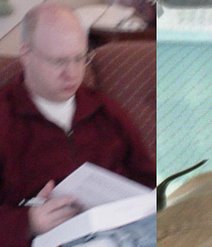This debate is different from many others on the same topic. It is very entertaining, being waged at the level of references to pop culture and anecdotes rather than deep philosophical argument. Even their names convey something of the tone of the debate: one is a comfort to faith, the other a barrier.
I was more than a little disappointed with Ray's debate style. He recited his arguments word-for-word from his book, God Doesn't Believe in Athiests. He has had a lot of time to fine-tune his humor, so he was almost like an actor reciting lines. In fact Ray had almost no interaction with Ron outside of an introductory sentence at the beginning of each of his periods of speaking. His first rejoinder began, "Thank you, Ron for that. Food for thought." With that he proceeded to ignore everything Barrier had just said and presented a second section from his book, entirely unrelated to any of Barrier's points. I've seen debates where it seems the opponents were speaking past one another, but in this debate it did not matter one bit what Barrier had to say. Every one of Comfort's rejoinders were directly scripted from his book.
Nevertheless, for my money Comfort was the clear winner. Though he never really debated, he was at least clear and his points made sense. Barrier, on the other hand, was rambling and almost totally incoherent. To say that most of his points were non sequitors would be granting too much. Instead, it was difficult to even understand what point he was even trying to make. For instance, his first point is to appeal to what he calls the principle of environmental incompatibility, where his argument runs something like this:
All things require an environment, therefore God must have an environment.
Theists claim that God's environment is the Supernatural.
The claim that something is supernatural presupposes that one knows all known natural laws.
It is therefore a claim to absolute knowledge.
Huh? Sorry if I missed exactly how that leads to the conclusion that God must not exist. He jumps from point to point assuming that we will infer how he got there, though his mental process is far from clear. I couldn't agree with him if I wanted to.
I am about 98% sure that Ray had an intense prayer meeting beforehand and prayed something like, "Lord, confuse the argument of my opponent." Honestly, I'm not sure how helpful these kinds of prayers are. They make me think Comfort won the debate by being a better debater rather than having a better argument.
For a more philosophical treatment of the theism debate, I recommend God? A Debate Between a Christian and an Atheist, by William Lane Craig and Walter Sinnott-Armstrong. Both are strong debaters at the top of their game, and most of the relevant issues are covered in depth.

